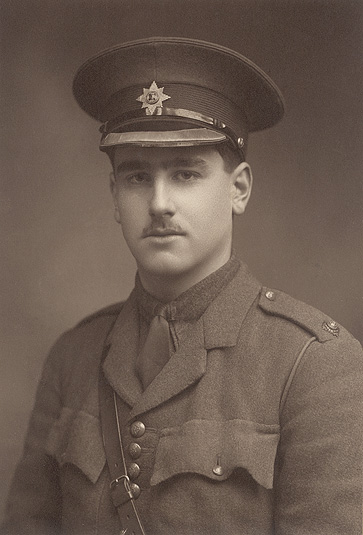War is not necessary, any life lost in armed conflict is not necessary. The death of millions of young men during The Great War was avoidable.
So was the death of John Kipling, son of Rudyard Kipling. It was the insistence of his father that brought John to the Irish  Guards despite being short-sighted. This was the reason he was rejected previously when wanted to enlist for the Army at the outbreak of war, aged 16. However, his father, himself an Imperialist, used his connections to get his son to the front. Rudyard himself was a war correspondent in 1915 and after what was described the rape of Belgium considered the conflict as a crusade against barbarism. He was keen his son should see ‘action’. It was this keenness that cost John Kipling his life.
Guards despite being short-sighted. This was the reason he was rejected previously when wanted to enlist for the Army at the outbreak of war, aged 16. However, his father, himself an Imperialist, used his connections to get his son to the front. Rudyard himself was a war correspondent in 1915 and after what was described the rape of Belgium considered the conflict as a crusade against barbarism. He was keen his son should see ‘action’. It was this keenness that cost John Kipling his life.
It was the death of John that made Rudyard write the poem My Boy Jack. Though set in a Navy background it describes the hope of the relatives of a young sailor. Metaphorically, it sketches the despair of John’s parents who indeed went on a lengthy search before declaring him dead.
“Have you news of my
boy Jack?”
Not this tide.
“When d’you think that
he’ll come back?”
Not with this wind
blowing, and this tide.
“Has any one else had
word of him?”
Not this tide.
For what is sunk will
hardly swim,
Not with this wind
blowing, and this tide.
“Oh, dear, what comfort
can I find?”
None this tide,
Nor any tide,
Except he did not shame
his kind
Not even with that wind
blowing, and that tide.
Then hold your head up
all the more,
This tide,
And every tide;
Because he was the son
You bore;
And gave to that wind
blowing, and that tide!
A more reflective ton comes to the fore in these two lines also written by Rudyard Kipling:
If any question why we died
Tell them – because our fathers lied.
It is argued whether this poem describes a father’s guilt or if it is an accusation of failing to learn vital lessons from the Boer War by the British Admiralty. Kipling repeatedly expressed his disappointment the way the British Expeditionary Force conducted during the first year of the war.
It must have been heart breaking for Rudyard as it must be for every parent to see their child die before them. Therefore the voice speaking can be interpreted as that of John accusing his parents generations. As such the poem has an eternal appeal because it is young men who risk their lives in conflicts, still do in the 21st. century and parents mourn their children.
RosarySausage: mentioned this in @wagnerc23 @rmcgreevy13011 @IT…. via twitter.com
LikeLike